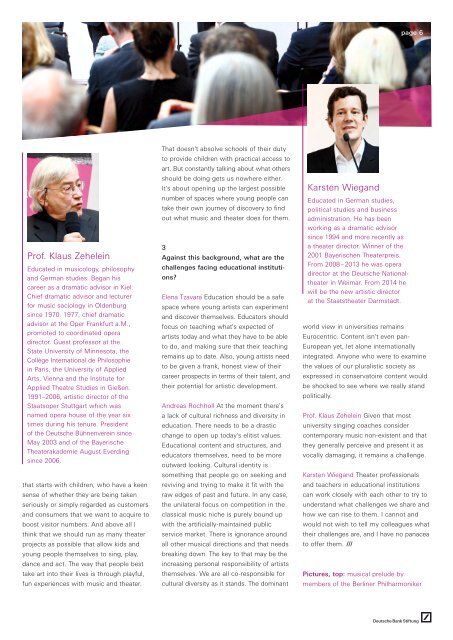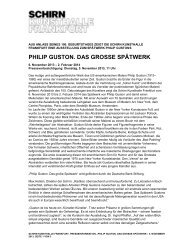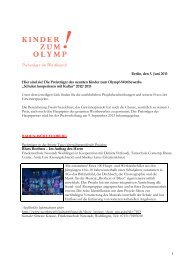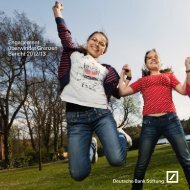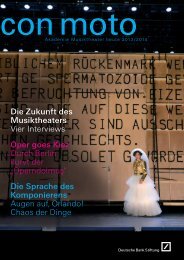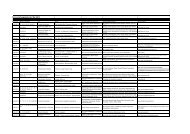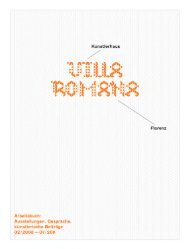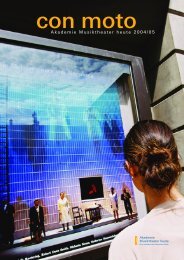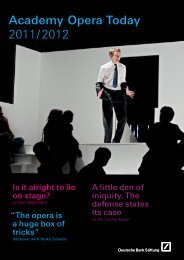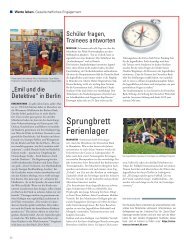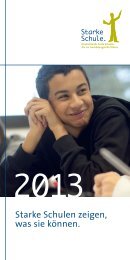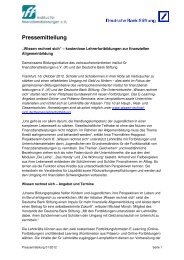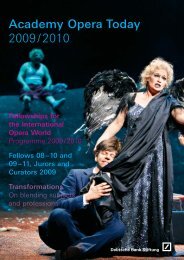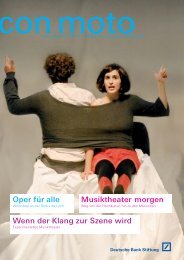Academy Opera Today 2013 / 2014 - Deutsche Bank Stiftung
Academy Opera Today 2013 / 2014 - Deutsche Bank Stiftung
Academy Opera Today 2013 / 2014 - Deutsche Bank Stiftung
You also want an ePaper? Increase the reach of your titles
YUMPU automatically turns print PDFs into web optimized ePapers that Google loves.
page 6<br />
Prof. Klaus Zehelein<br />
Educated in musicology, philosophy<br />
and German studies. Began his<br />
career as a dramatic advisor in Kiel.<br />
Chief dramatic advisor and lecturer<br />
for music sociology in Oldenburg<br />
since 1970. 1977, chief dramatic<br />
advisor at the Oper Frankfurt a.M.,<br />
promoted to coordinated opera<br />
director. Guest professor at the<br />
State University of Minnesota, the<br />
Collège International de Philosophie<br />
in Paris, the University of Applied<br />
Arts, Vienna and the Institute for<br />
Applied Theatre Studies in Gießen.<br />
1991–2006, artistic director of the<br />
Staatsoper Stuttgart which was<br />
named opera house of the year six<br />
times during his tenure. President<br />
of the <strong>Deutsche</strong> Bühnenverein since<br />
May 2003 and of the Bayerische<br />
Theaterakademie August Everding<br />
since 2006.<br />
that starts with children, who have a keen<br />
sense of whether they are being taken<br />
seriously or simply regarded as customers<br />
and consumers that we want to acquire to<br />
boost visitor numbers. And above all I<br />
think that we should run as many theater<br />
projects as possible that allow kids and<br />
young people themselves to sing, play,<br />
dance and act. The way that people best<br />
take art into their lives is through playful,<br />
fun experiences with music and theater.<br />
That doesn't absolve schools of their duty<br />
to provide children with practical access to<br />
art. But constantly talking about what others<br />
should be doing gets us nowhere either.<br />
It's about opening up the largest possible<br />
number of spaces where young people can<br />
take their own journey of discovery to find<br />
out what music and theater does for them.<br />
3<br />
Against this background, what are the<br />
challenges facing educational institutions?<br />
Elena Tzavara Education should be a safe<br />
space where young artists can experiment<br />
and discover themselves. Educators should<br />
focus on teaching what's expected of<br />
artists today and what they have to be able<br />
to do, and making sure that their teaching<br />
remains up to date. Also, young artists need<br />
to be given a frank, honest view of their<br />
career prospects in terms of their talent, and<br />
their potential for artistic development.<br />
Andreas Rochholl At the moment there's<br />
a lack of cultural richness and diversity in<br />
education. There needs to be a drastic<br />
change to open up today's elitist values.<br />
Educational content and structures, and<br />
educators themselves, need to be more<br />
outward looking. Cultural identity is<br />
something that people go on seeking and<br />
reviving and trying to make it fit with the<br />
raw edges of past and future. In any case,<br />
the unilateral focus on competition in the<br />
classical music niche is purely bound up<br />
with the artificially-maintained public<br />
service market. There is ignorance around<br />
all other musical directions and that needs<br />
breaking down. The key to that may be the<br />
increasing personal responsibility of artists<br />
themselves. We are all co-responsible for<br />
cultural diversity as it stands. The dominant<br />
Karsten Wiegand<br />
Educated in German studies,<br />
political studies and business<br />
administration. He has been<br />
working as a dramatic advisor<br />
since 1994 and more recently as<br />
a theater director. Winner of the<br />
2001 Bayerischen Theaterpreis.<br />
From 2008–<strong>2013</strong> he was opera<br />
director at the <strong>Deutsche</strong> National -<br />
theater in Weimar. From <strong>2014</strong> he<br />
will be the new artistic director<br />
at the Staatstheater Darmstadt.<br />
world view in universities remains<br />
Eurocentric. Content isn't even pan-<br />
European yet, let alone internationally<br />
integrated. Anyone who were to examine<br />
the values of our pluralistic society as<br />
expressed in conservatoire content would<br />
be shocked to see where we really stand<br />
politically.<br />
Prof. Klaus Zehelein Given that most<br />
university singing coaches consider<br />
contemporary music non-existent and that<br />
they generally perceive and present it as<br />
vocally damaging, it remains a challenge.<br />
Karsten Wiegand Theater professionals<br />
and teachers in educational institutions<br />
can work closely with each other to try to<br />
understand what challenges we share and<br />
how we can rise to them. I cannot and<br />
would not wish to tell my colleagues what<br />
their challenges are, and I have no panacea<br />
to offer them. ///<br />
Pictures, top: musical prelude by<br />
members of the Berliner Philharmoniker


